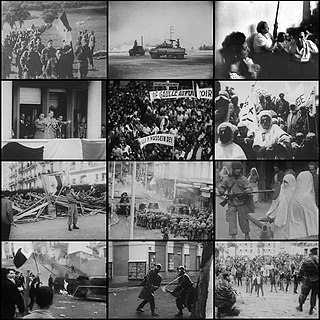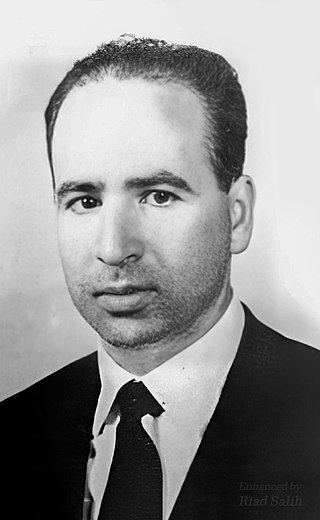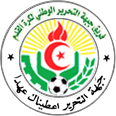
The Algerian War was a major armed conflict between France and the Algerian National Liberation Front (FLN) from 1954 to 1962, which led to Algeria winning its independence from France. An important decolonization war, it was a complex conflict characterized by guerrilla warfare and war crimes. The conflict also became a civil war between the different communities and within the communities. The war took place mainly on the territory of Algeria, with repercussions in metropolitan France.
The History of Algeria from 1962 to 1999 includes the period starting with preparations for independence and the aftermath of the independence war with France in the 1960s to the Civil War and the 1999 presidential election.

Algerian nationalism is pride in the Algerian identity and culture. It has been historically influenced by the conflicts between the Deylik of Algiers and European countries, the French conquest of Algeria and the subsequent French colonial rule in Algeria, the Algerian War, and since independence by Arab socialism, Islamism and Arab nationalism.

Mohamed Boudiaf, also called Si Tayeb el Watani, was an Algerian political leader and one of the founders of the revolutionary National Liberation Front (FLN) that led the Algerian War of Independence (1954–1962). Boudiaf was exiled soon after Algerian independence, and did not go back to Algeria for 27 years. He returned in 1992 to accept a position of Chairman of the High Council of State, but was assassinated four months later.

The National Liberation Front commonly known by its French acronym FLN, is a nationalist political party in Algeria. It was the principal nationalist movement during the Algerian War and the sole legal and ruling political party of the Algerian state until other parties were legalised in 1989.

Chadli Bendjedid was an Algerian nationalist politician who served as the third President of Algeria. His presidential term of office ran from 9 February 1979 to 11 January 1992.

Ahmed Ben Bella was an Algerian politician, soldier and socialist revolutionary who served as the head of government of Algeria from 27 September 1962 to 15 September 1963 and then the first president of Algeria from 15 September 1963 to 19 June 1965.

Houari Boumédiène was an Algerian military officer and politician who served as Chairman of the Revolutionary Council of Algeria from 19 June 1965 until 12 December 1976 and thereafter as the second president of Algeria until his death in 1978.

Ahmed Ben Messali Hadj was an Algerian nationalist politician dedicated to the independence of his homeland from French colonial rule. He is often called the "father" of Algerian nationalism.

Hocine Aït Ahmed was an Algerian politician. He was founder and leader until 2009 of the historical political opposition in Algeria.

Krim Belkacem was the historic leader of the National Liberation Front during the Algerian War. As vice-president of the GPRA, he was the sole signatory of the Évian Accords on the Algerian side. After the 1965 coup d'état, he went into exile and was assassinated in Germany in 1970.
The Algerian National Movement was a political party and movement founded by Messali Hadj in 1954 to counteract the efforts of the National Liberation Front (FLN) during the Algerian War.

Larbi Ben M'hidi, commonly known as Si Larbi or simply as Ben M'hidi, was a prominent Algerian revolutionary leader during the Algerian war of independence. He is one of the six founding members of the Front de Libération Nationale that launched an armed revolt throughout Algeria and issued a proclamation calling for a sovereign Algerian state.

Marcel Bigeard, personal radio call-sign "Bruno", was a French military officer and politician who fought in World War II, the First Indochina War and the Algerian War. He was one of the commanders in the Battle of Dien Bien Phu and is thought by many to have been a dominating influence on French "unconventional" warfare thinking from that time onwards. He was one of the most decorated officers in France, and is particularly noteworthy because of his rise from being a regular soldier in 1936 to ultimately concluding his career in 1976 as a Lieutenant General and serving in the government of Valéry Giscard d'Estaing.

The Oujda group, also known as the Oujda clan, Tlemcen group was a group of military officers and politicians in Algeria that operated during the Algerian War (1954–62). After the independence of Algeria, the Oujda group dominated Algerian politics after the Algerian summer crisis in 1962.
Colonel Mahmoud Chérif (1912–1987) was an Algerian military leader and politician. He was born in Chéria in the Tébessa governorship (wilaya) in 1912. After school, he joined the French army and graduated from training courses with the rank of lieutenant. He participated as a French-Algerian soldier on the side of the Allies in the Second World War. After the war, he joined Ferhat Abbas's UDMA movement, which worked peacefully—but unsuccessfully—for Algerian rights. Soon after the outbreak of the Algerian War of Independence in 1954, he joined the Front de libération nationale (FLN) resistance movement, where his military command experience guaranteed him an important role. He headed the rebellion in FLN's Wilaya I -- an area which included the Tébessa region—and was later promoted colonel in the Armée de libération nationale (ALN), FLN's armed wing. When the FLN created its government-in-exile (GPRA) in 1958, Chérif was made minister of armament and materiel under Abbas's presidency, until a 1960 reshuffle.

The FLN football team, also known as Le onze de l'indépendance, was a team made up mainly of professional players in France, who then joined the Algerian independence movement of the National Liberation Front (FLN), and assisted in organizing football matches against national football teams. The FLN linked African football to anti-colonial resistance using the idea of Pan-Africanism as a legitimizing tool and symbol of national identity.
Youcef Zighoud, also known as Colonel Si Ahmed, was an Algerian FLN party fighter during the Algerian War. On August 20, 1955, he planned an attack against the French occupation in Philippeville and its surroundings commonly referred to as the Battle of Philippeville. The attack led to a harsh crackdown and repression by the French government. While numbers are disputed, the conflict resulted in between 1,239 and 12,000 deaths. Zighoud, from whom the town of Zighoud Youcef takes its name, was killed in Sidi Mezghiche during a clash with the French Army.
Mohamed Aïchaoui was an Algerian journalist and militant in the nationalist movement against French Algeria. Aïchaoui wrote the Declaration of 1 November 1954, the National Liberation Front's first appeal to the Algerian people at the start of the Algerian War. After earlier imprisonment and torture, he died in a 1959 clash with the French army.
Ahmed Mahsas was an Algerian militant in the nationalist movement against French Algeria.














